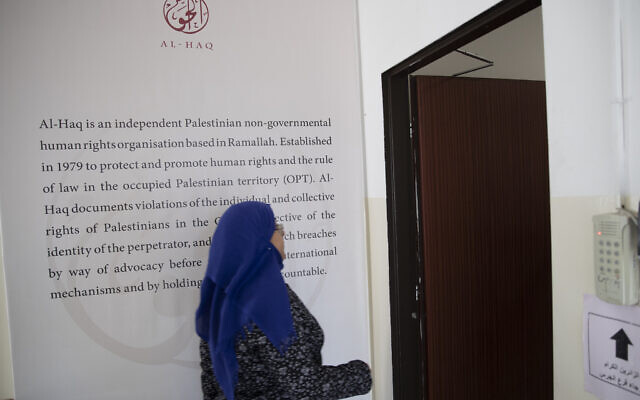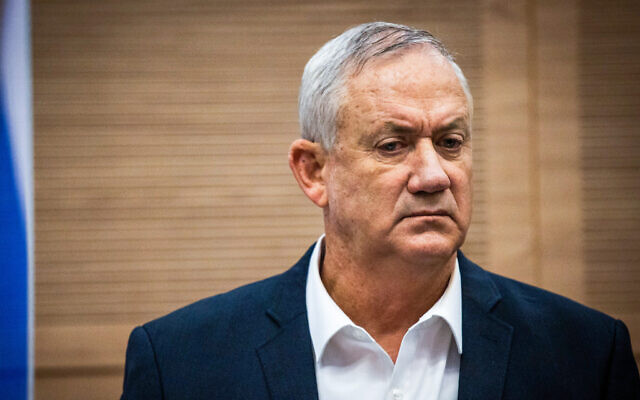Defense official says evidence tying 6 Palestinian rights organizations to terror is ‘ironclad’; ministers slam Gantz for not telling them about plan to make bodies illegal

An envoy from the Shin Bet security service and the Foreign Ministry will be sent to the United States with “unequivocal” information proving six Palestinian human rights groups had terror ties that justify them being outlawed, a senior Israeli defense official said Sunday.
Israel claims the targeted groups were a front for a small PLO faction with a violent history, the Popular Front for the Liberation of Palestine.
On Friday afternoon, Defense Minister Benny Gantz announced that the six Palestinian civil society groups — including prominent ones with significant backing and oversight from the European Union and other international bodies — were being designated terror organizations, asserting that they worked on behalf of the PFLP, which Israel considers a terror group.
Applying the terror label to the six groups, including some that receive European funding, appeared to catch the US and Europe off-guard.
US officials said they were not warned in advance that Israel was moving against the groups and that they wanted more evidence. Israel later insisted some Biden administration officials were notified ahead of time.
In the Sunday briefing, the senior official told reporters that the intelligence connecting the organizations to the PFLP was “ironclad.” He said the material included “unequivocal evidence that includes video footage, photos, payment receipts that tie the said groups to the backing of terror activity.”
The pattern of activity in using civilian organizations as a cover for terror activity and financing is a familiar method for the PFLP, he said.

Israel is aware of the significance of declaring the groups terror organizations, the official said, adding that thorough preparation had been made before the announcement, with all relevant entities provided with the evidence.
US State Department spokesperson Ned Price said that Israel did not warn Washington of the move. Israeli officials, speaking anonymously, denied the charge.
One of those who reviewed the evidence against the six Palestinian groups was State Prosecutor Amit Aisman, Haaretz reported. It was only after Aisman gave his approval that the Shin Bet reported its findings to Gantz, the report said.
Aisman reviewed material showing that, in some cases, only the managers of the rights groups knew that cash was being funneled to the PFLP, while more junior activists were unaware.
Justice Ministry officials have already prepared for any petitions against the terror designations, the report said. Gantz, for the time being, does not plan to open a criminal investigation into any of the groups’ members.
A source familiar with the legal preparations said that according to a 2016 anti-terror law, a human rights organization can be declared a terror group if it is found to have helped a terror group over time, is tied to such a group, or acts on its behalf, even if it also carrying out humanitarian work. The source said the Shin Bet evidence showed that the links between the PFLP and the involved rights groups surpassed the minimum threshold for the law to be applied.

According to Hebrew media reports, Gantz did not tell Prime Minister Naftali Bennett that he was going to sign off on classifying the rights groups as terror organizations. A statement on behalf of Gantz said that such procedures do not require informing the prime minister.
Other ministers were also unaware of the development ahead of time. During a meeting of coalition faction chiefs on Sunday, Health Minister Nitzan Horowitz and Transportation Minister Merav Michaeli, leaders of the Meretz and Labor parties, respectively, complained to Bennett that Gantz had acted alone on the matter, Hebrew media reported.
Horowitz demanded to be shown the evidence tying the rights groups to the terror activities. Gantz, who was not at the meeting, later responded that, while he was prepared to discuss the matter, he was adamant that the evidence not be presented to the full cabinet, which he said was too broad a forum. Gantz said he was willing to present the material to the security cabinet or one of the relevant sub-committees of the Knesset Foreign Affairs and Defense Committee.
Public Security Minister Omer Barlev said Sunday that the issue was never discussed in the security cabinet, and he that had not seen any of the material tying the groups to the PFLP.

The Defense Ministry provided no concrete evidence to demonstrate a direct connection between the organizations and the PFLP in its announcement on Friday.
The list consisted of: Union of Palestinian Women’s Committees; ADDAMEER — Prisoner Support and Human Rights Association; Bisan Center for Research and Development; al-Haq Organization; Defense for Children International — Palestine (DCI-P); and the Union Of Agricultural Work Committees.
Gantz’s move sparked a swift backlash around the globe, with the EU, the Palestinian Authority, progressive Democrats, US Jewish groups, and international and Israeli human rights organizations expressing criticism.
Both Israeli military and civilian law ban supporting or joining a terror group, and violators can face years in prison. Israeli authorities can also seize assets belonging to terror organizations and prohibit funding their activities. Donors may also be subject to significant jail time.
Israeli authorities have charged before that the PFLP has pilfered millions of euros from civil society organizations affiliated with its members to fund terrorist activities.
As reported by The Times of Israel
